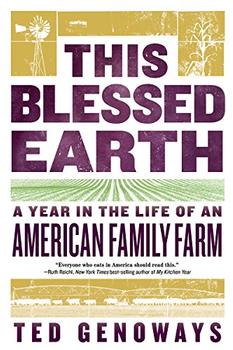Summary | Excerpt | Reviews | Beyond the Book | Readalikes | Genres & Themes | Author Bio

A Year in the Life of an American Family Farm
by Ted Genoways
Kyle didn't own this acreage, just south of the Platte River in east-central Nebraska, but his girlfriend, Meghan Hammond, was part of the sixth generation of her family to live and farm in this area—and Meghan and Kyle were starting to talk about a wedding in the next year. Once that happened, Meghan's father, Rick, figured it would be time to give them a stronger hand in the operation. Whenever people asked Rick what he raised on his farm, he always responded, "Corn and cattle and kids." By the end of the year, if all went as planned, Meghan and Kyle wouldn't be kids anymore.
But handing over control of the operation—"succession as it's known—is one of the hardest times in the life of any family farm. The older generation always struggles to let go of the reins, to trust their kids to carry forward a long and fragile tradition. The younger generation bridles against the meddling and second-guessing and feels the double weight of scrutiny and doubt in every misstep. Many farms don't officially change hands until the older generation dies, leaving the rising generation beholden to their parents until they're well into adulthood and often into their fifties or sixties. It breeds resentment and too often divides generations or turns brothers and sisters against each other. It is so stressful and legally complex that there are psychiatrists and attorneys alike who build whole practices around helping families navigate the process. But on the Hammond farm, it was even more complicated than that.
The collapse of commodities prices was forcing the family to wrestle with how best to run the farm in the future. Years ago, Rick had tried raising organic corn and direct marketing his grass-fed black Angus cattle, but those efforts had largely failed. Now, he was not only planting crops resistant to a range of herbicides for commercial sale but actually growing genetically modified seed corn for DuPont Pioneer to sell to other farmers. He said he couldn't say no to the guaranteed rates that Pioneer pays those who raise their seed stocks. Over the years, that increased income had allowed Rick to expand his operation, but now he'd come to rely on it. Without the premium from Pioneer, a down market, like the one his family was facing in the coming year, would place the whole farm at risk. And even Pioneer was not impervious to the vagaries of the Board of Trade. With per-bushel prices so low, the company was worried that there would be less demand for corn seed in 2015. So Rick had been informed that Pioneer intended to reduce the number of acres they were planting—and, with it, reduce payments to the farmers who planted for them. The company just didn't know where it would cut yet or by how much. "The seed corn is about half of what we raise," he told me. "If they gave us all that we try to shoot for, it's more like three-fourths."
Without that money coming in, Rick knew that he couldn't afford to buy new machinery for the year, couldn't afford to replace his center-pivot irrigation system. He needed to have a full year of paying down those loans, not incurring new debts. He needed a year in which everything went right—crops came in early and healthy, prices rebounded, equipment held out. And if he was forced to take out more loans, he needed interest rates to stay low. "We're trying to tighten our belt and get rid of machine debt, pivot debt, and then get it down to land debt," he told me.
And that penny-pinching would be all the more important as the family faced the still-uncertain fate of the proposed Keystone XL. That pipeline project, intended to carry heavy crude pumped from the Alberta tar sands in Canada nearly 2,000 miles to Port Arthur and Houston on the Texas Gulf Coast, was slated to cut right through major portions of the family cropland. Meghan and Rick vehemently opposed the project, arguing that it would not only further slash their crop production but that it also posed an existential threat to the Ogallala Aquifer, the underground reservoir of freshwater that they depend on to irrigate crops and water their cattle.
Excerpted from This Blessed Earth by Ted Genoways. Copyright © 2017 by Ted Genoways. Excerpted by permission of W.W. Norton & Company. All rights reserved. No part of this excerpt may be reproduced or reprinted without permission in writing from the publisher.
Your guide toexceptional books
BookBrowse seeks out and recommends the best in contemporary fiction and nonfiction—books that not only engage and entertain but also deepen our understanding of ourselves and the world around us.